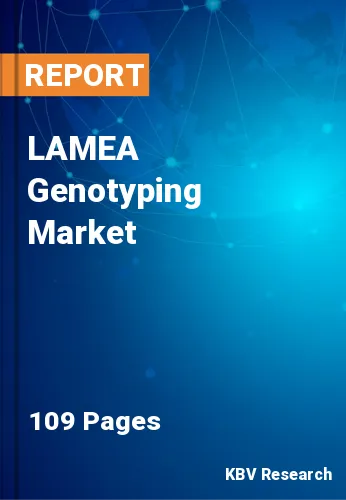The Latin America, Middle East and Africa Genotyping Market would witness market growth of 18.1% CAGR during the forecast period (2022-2028).
SNPs (single nucleotide polymorphisms) are alterations in DNA that occur at specific locations within the genome. For example, most people have a C nucleotide at a given base location in their genome, whereas a small percentage of people have an A. It indicates that there is an SNP with two potential nucleotide changes at this exact position, C or A. The human genome contains over 660 million SNPs, making them the most prevalent type of genetic differences in humans. Traits such as eye color and hereditary diseases like cystic fibrosis and sickle cell anemia, as well as serve as markers for the development of complicated diseases like diabetes and Alzheimer's disease.
By forecasting an individual's likelihood of acquiring specific diseases or designing targeted medicines tailored to the disease's genetic foundation, SNP genotyping can help usher in a new era of personalized medicine. SNP-based tests could aid in the selection of the appropriate treatment course because SNPs are linked to individual therapeutic responses.
During the first peak of the local COVID-19 outbreak, to figure out where SARS-CoV-2 came from and how it spread and evolved in the United Arab Emirates. They discovered a global clade distribution as well as eleven novel genetic variants that were nearly unknown elsewhere and designated five subclades unique to the UAE virus population. Human-to-human transmission across settlements was linked to local business activity.
The United Arab Emirates (UAE) is the first nation to authorize a Chinese COVID-19 vaccine. It is one of the world's most well-known international business and tourist centers. Even though the pandemic lasted for a long time, only a few SARS-CoV-2 samples were sequenced, and the virus's transmission and evolution trends in this area are unknown. On January 29th, 2020, the first case of SARS-CoV-2 was discovered in the country.
The Brazil market dominated the LAMEA Genotyping Market by Country in 2021, and would continue to be a dominant market till 2028; thereby, achieving a market value of $630.4 million by 2028. The Argentina market is poised to grow at a CAGR of 18.7% during (2022 - 2028). Additionally, The UAE market would display a CAGR of 17.8% during (2022 - 2028).
Based on Product, the market is segmented into Reagents & Kits, Instruments, and Software & Services. Based on Application, the market is segmented into Diagnostics & Personalized Medicine, Agricultural Biotechnology, Pharmacogenomics, Animal Genetics, and Others. Based on End Use, the market is segmented into Diagnostics & Research Laboratories, Pharmaceutical & Biopharmaceutical Companies, Academic Institutes, and Others. Based on Technology, the market is segmented into PCR, Sequencing, Capillary Electrophoresis, Microarray, Mass Spectrometry, and Others. Based on countries, the market is segmented into Brazil, Argentina, UAE, Saudi Arabia, South Africa, Nigeria, and Rest of LAMEA.
Free Valuable Insights: The Global Genotyping Market is Predict to reach $30.9 Billion by 2028, at a CAGR of 14.7%
The market research report covers the analysis of key stake holders of the market. Key companies profiled in the report include F. Hoffmann-La Roche Ltd., Danaher Corporation, Agilent Technologies, Inc., Thermo Fisher Scientific, Inc., Qiagen N.V., Illumina, Inc., Bio-Rad Laboratories, Inc., Eurofins Scientific Group, and Fluidigm Corporation.
By Product
By Application
By End Use
By Technology
By Country
Our team of dedicated experts can provide you with attractive expansion opportunities for your business.

